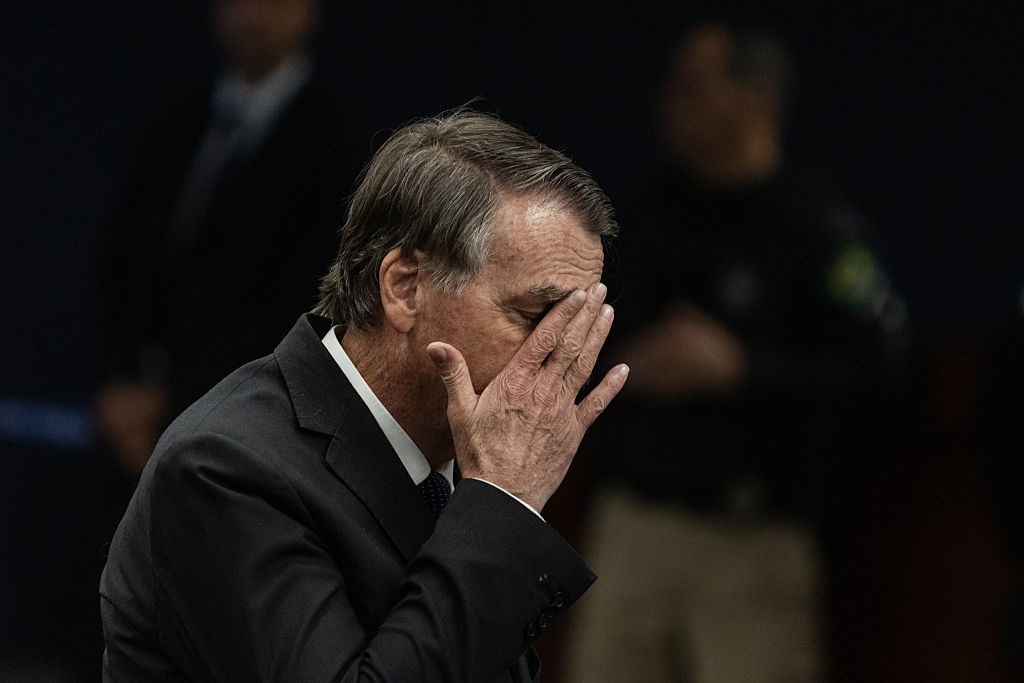Brazilian President Jair Bolsonaro was convicted on Thursday of plotting a coup to stay in power following his defeat in the 2022 election. He was sentenced to 27 years in prison. It’s a decision without precedent in Brazilian or Latin American history. It also puts Brazil on the forefront of efforts to combat the global malaise of democratic backsliding.
[time-brightcove not-tgx=”true”]
It will be a while before we know how Bolsonaro’s conviction will affect U.S.-Brazilian ties. President Donald Trump, who called the verdict “very bad,” had months earlier ensured that the trial would attract global attention by imposing a 50% tariff on many Brazilian goods in retaliation for what he called a “witch hunt.” His Treasury Department also sanctioned Alexandre de Moraes, the Brazilian Supreme Court Justice overseeing the trial, following lobbying from Bolsonaro’s son Eduardo who is living in exile in the U.S.
Determining the trial’s impact on Brazilian democracy will take even longer. Brazil is deeply polarized and the trial exacerbated political tensions. The polarization was vividly displayed on the eve of the start of the trial, when tens of thousands of Brazilians took to the streets to express their views in favor and against Bolsonaro’s prosecution.
For now, however, a more urgent task is understanding how Brazil got this prosecution done. After all, the recent experience of the U.S. suggests the difficulties inherent in prosecuting a former president, even as many inside the Justice Department thought there was a viable case for obstructing the peaceful transfer of power following the 2020 election.
No single factor accounts for Bolsonaro’s successful prosecution. Instead, there’s a mingling of legal, political, and societal factors. The main one is the assertion of judicial power by the Federal Supreme Court and the Superior Electoral Court (TSE). In the Bolsonaro era, these institutions have shown extraordinary independence in the pursuit of accountability.
Before the 2022 elections, the TSE issued a list of 20 rebuttals to Bolsonaro’s electoral claims, calling them “unacceptable electoral denialism.” In 2023, the TSE charged Bolsonaro with making unfounded claims of electoral fraud. It eventually barred him from running for office until 2030 over abuse of power.
In February, following a sprawling two-year investigation, Brazil’s chief prosecutor charged Bolsonaro for an alleged plot to assassinate President Lula two weeks before he took office. On Thursday, a five-member panel of the Supreme Court voted 4-1 to convict Bolsonaro on all five charges, including attempting to stage a coup, leading an armed criminal group, and attempting a violent abolition of the democratic rule of law. They also said he knew of a plot to assassinate Lula.
But two other factors don’t get as much attention as they deserve. The first one is the inability or unwillingness of the Brazilian right to protect Bolsonaro. Brazil is a multiparty system and lacks anything resembling the U.S. Republican Party. A Republican-controlled Senate twice acquitted Trump after his two impeachments, and thereby enabled his illiberal, backsliding agenda. By contrast, the Brazilian right is fragmented (at least four parties claim a conservative identity in the Brazilian Congress) and not particularly beholden to Bolsonaro.
After the results of the 2022 elections were announced, some of Bolsonaro’s fiercest supporters, including then-Speaker of the Chamber of Deputies Arthur Lira, quickly acknowledged Lula’s victory. Lira noted that “the will of the majority, as expressed in the polls, can never be contested.” And while many on the right have been critical of the prosecution, which they view as judicial overreach, some conservative politicians with presidential ambitions of their own, such as São Paulo Governor Tarcísio de Freitas, appear ready to turn the page on Bolsonaro.
The second factor is the robust mobilization of Brazil’s civil society. It incorporated opposition political parties, the trade unions, human rights organizations, professional associations such as the Brazilian Bar Association, major newspapers, LGBTQ groups, the heads of universities and cultural institutions, and the Brazilian Conference of Bishops. These groups called out Bolsonaro’s false claims about a stolen election. More importantly, they have made the case that Bolsonaro deserved to be held accountable for having endangered democracy. That means a lot in Brazil given the country’s recent political history; it lost democracy to a military coup in 1964, with democracy restored in 1985 and a brand-new democratic constitution enacted three years later.
Public opinion data mirrors the fruits of the labor of civil society. A poll conducted between Sept. 11-12 by the Brazilian polling firm Datafolha found that a majority supported the Supreme Court’s decision to prosecute Bolsonaro, including an earlier decision to put him under house arrest for fears that he might flee Brazil.
It’s common in Brazil to hear concerns that the courts have grown too powerful and that this poses a problem for democracy. Bolsonaro’s sentence has also been criticized as excessive, and his lawyers have said they will appeal the decision. As the liberal newspaper Folha de S. Paulo put it in an editorial: “Fair conviction, high punishment.” These are arguments for another day. For now, it is important to pause and marvel at what Brazil has accomplished.
Clearly, the bulk of the credit goes to all the work Brazilians have done since the transition to democracy to empower their judicial institutions. But the U.S. also deserves credit as well. Since the end of the Cold War, U.S. democracy promotion efforts in Brazil and across Latin America—under both Democratic and Republican administrations—have centered on strengthening the courts and upholding the rule of law.
At least in Brazil, Latin America’s largest democracy, these efforts have paid off.

